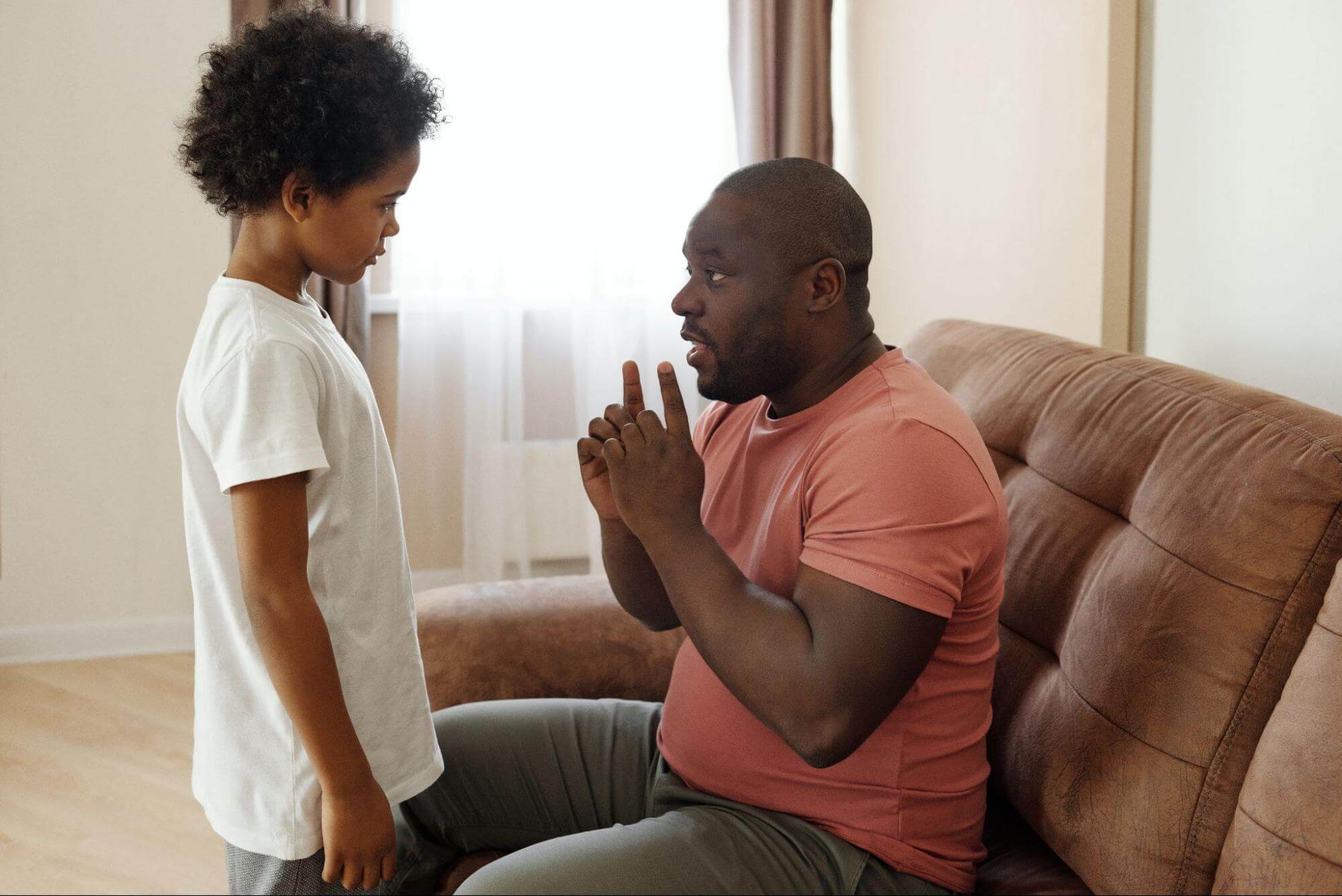Handling Defiant Child Behavior To Foster Healthy Social Development

A defiant child is a misunderstood child. Knowing this may not ease their pain, nor the struggle of living with a kid who’s constantly at war with you and everyone else, but it does give you a starting point to begin helping. We’ll be delving deep into defiant behavior, showing you how to cope with difficult kids while explaining the details of a deep-rooted disorder that could be smothering your child’s ability to communicate.
Contents:
- Odd and defiant children
- Defiant behavior according to each age group
- How to handle a defiant child?
Odd and defiant children

Prostock-studio/Shutterstock.com
Handling frustration, managing emotions, and developing strong interpersonal skills are a part of life and a crucial component of every child’s development. There’s always an underlying reason for defiance, and bouts of resistance and confrontation are normal. In fact, oddness and a strong will show individuality and a child who’s realized the power of their voice. However, if your kid is constantly angry, always acting out, and has a pattern of disobedient behavior with a disdain for authority – they could be suffering from Oppositional Defiant Disorder (ODD).
What is ODD?
Oppositional defiant disorder is a behavioral health problem characterized by recurrent uncooperative, argumentative, angry behavior. Yale Medicine defines this behavioral disorder as an ongoing pattern of anger, irritability, argumentativeness, and potential spitefulness lasting six months or more. It is usually accompanied by resistance to authority figures, including constant challenges to those in control, whether parents, teachers, or peers. Blame-casting, anxiety, rapid mood fluctuations, and temper outbursts are common.
Signs of ODD
ODD can manifest as early as during preschool years. The disorder at times shows up during adolescence and sometimes later, but most often arises before a child turns a teenager. A child who does not know how to communicate their frustration, anger, or rebellious view will feel like things are out of their control and then explode with an emotional outburst.
The American Psychiatric Association has published the following ODD symptoms to be on the lookout for:
- frequent loss of temper;
- quickly triggered anger and irritability;
- easily annoyed by other people and things;
- prevailing pessimism;
- hypersensitivity;
- frequent anger;
- resent towards self and others;
- argumentativeness with elders and authority figures;
- non-compliance with rules and requests for cooperation;
- deliberate annoyance;
- antagonizing behavior;
- blaming others for their own shortcomings;
- revenge/vindictiveness;
- spiteful behavior is shown at least twice in six months.
Keep in mind that isolated events do not characterize ODD but rather a behavior pattern that has lasted for over six months in total.
ODD severity
There are three accepted severities of ODD, namely, mild, moderate, and severe.
Mild
Mild ODD only happens in one particular setting. For example, a child with mild ODD may only act out at home, around certain peers, or in a particular class.
Moderate
Once a child with ODD manifests symptoms in two places, their disorder is classified as moderate.
Severe
Severe ODD occurs in three or more environments.
How ODD is treated

Prostock-studio/Shutterstock.com
Oppositional defiant disorder is treated using various psychotherapy approaches focused on helping parents and children communicate better while learning to govern frustration and overcome rebelliousness and social anxiety. Although many children with ODD are on medication for other related mental disorders, no schedule of drugs is prescribed by default.
Instead, a combination of approaches incorporating parental management classes and cognitive behavioral therapy is used to treat ODD. Children are taught how to control their thoughts and emotions. Treatments focus on understanding emotions, emotional regulation, and triggers for deviant behavior. Kids learn healthy ways to express themselves, fundamental communication techniques, and strategies to manage their feelings.
What is the difference between ODD and developmental defiance?
It can be challenging to determine whether a child is strong-willed and simply in a period of natural development whereby they’re struggling to process maturity milestones or suffer from Oppositional Defiant Disorder. After all, being naughty is natural. All children, and adults, will experience highs, lows, and periods of processing, but they must be precisely that – periods of difficulty adjustment not lasting, ongoing personality traits.
Take care of your child, even you’re not around them. Install the Findmykids app and make sure that everything is fine – pinpoint the kid’s location, listen to the sound around, and get in touch quickly if necessary.
Defiant behavior according to each age group

Prostock-studio/Shutterstock.com
Every period of development is accompanied by life lessons that need to be realized, comprehended, and integrated. Just because your child is being slightly difficult, argumentative, rebellious or irritable, this doesn’t mean that they’ve got a behavior disorder. Here’s a closer look at the various types of expected behavior that you can expect at each age.
Age 1 to 2
Extremely young children don’t understand intentions. They see and act without thinking of the meaning. For example, snatching a toy or biting another isn’t an act of malice. It’s simply to see what the thing is. One to two-year-olds are starting to understand possession and feel that everything is theirs. Don’t mistake this for bossiness or selfish tendencies. Any tantrums usually are simply due to frustration – too many emotions and far too few words, and other communication skills.
Age 3
Wanting more control as independence develops can lead to more tantrums. Kids will want to do things for themselves, demanding to act as an independent person. Grow used to hearing the word “no” as your little one will develop a fondness for the word as they learn to assert themselves. A desire to take control and plan their activities and surroundings is expected, as are fears and phobias and the resulting adversarial reactions that come with them. Jealousy will begin to rear its head, while you can also expect kids to act naughty if they feel another is receiving “their” attention.
Age 4
By 4 years old, kids are beginning to realize how much power their words have. While their command of speech is still in its infancy, gestures and actions will back up demands and other attempts to get their way. Being critical of the world is normal, and most children will start to explore their independence. This can translate to stubborn tendencies and a bossy attitude which shouldn’t be given too much attention. Fear of separation from parents, friends, or caregivers can cause anxiety at this age which will manifest as deviation from their positive habits accompanied by anger, tears, or irritability.
Age 5

Prostock-studio/Shutterstock.com
Five-year-olds have a good grasp of rules and structure but still don’t have the insight to understand why they’re not flexible. Anger towards others when losing at a game is common, and kids at this age will frequently become frustrated when others hold an opposing point of view. Fear of failure, criticism, and a desire to understand everything can lead to feeling like they’re overwhelmed. This can impact everything from their attention span to their willingness to cooperate. If they’re sensitive and moody from time to time, it’s normal.
Age 6
Six is an age of tantrums, trials, and pushing the limits. As kids begin to feel competent over their skills and abilities, they will start to test the bounds of their independence. Without recognition and both acknowledging and allowing their efforts to work on themselves and independent interests, what looks like disrespect can form as well as an adversarial attitude towards non-related people and things. Children demand meaningful praise. Overpraising or patronizing a child will trigger distance, just like showing too little interest in their lives. Six-year-olds know a lot and want to share. If they don’t, defiance and deviance ensue.
Age 7
The inquiring mind of a seven-year-old will want to know why the rules don’t bend in their favor. Differences between how they live their lives and others’ lives can cause confusion and a sense of being misunderstood. Dramatic reactions and hypersensitivity are normal when passing. Trying to explain their feelings will often lead to frustration and anger, which can last far longer than you think. The opinions of others are beginning to sink in, and sensitivity triggers are to be expected. Just be there to support and help them come up with encouragement.
“Mаma, I am a big now”: how does the 7-year-old child crisis manifest itself?
Age 8
Eight-year-olds are intolerant and very sensitive to outside opinions. If your little one is fighting with you and the rest of their friends frequently, it could be due to struggling with understanding grey areas of life. Jumping between extremes is normal for children of this age who only seem to think in black and white. With so much going on in their minds, it’s perfectly acceptable to experience confusion and moodiness. Unless you’re being clear about what you want and what they’re being praised for, the uncertainty will lead to irrational mood swings.
Age 9

Prostock-studio/Shutterstock.com
Distance will begin to form in the parental relationship from the age of nine. Friends are taking preference, and social skills are starting to bloom. It’s normal for a nine-year-old to want to have secrets, and they’ll push up against the rules in an attempt to enforce the way they want things to be. Expect a little more argumentativeness, bouts of abrasiveness, and an attitude that’s slightly more self-centered. Offering independence and allowing freedom for their own directives will help them open up and stay close.
Age 10 to 11
By ten to eleven years old, your child will most likely have overcome tantrums. Misbehavior and deviation leading to directly breaking the rules are far more common. Kids will constantly question regulations and want to know all the details. If they have more justifications for their choice of actions than an understanding of why what they’re doing is wrong (including the repercussions), then their defiant attitude will grow bolder. Promises are of vital importance to children who are beginning to realize the power of choice backed by action, and any broken promises toward them can trigger overwhelming feelings of anxiety, anger, and general emotional volatility.
Age 12
Preteens are absorbed by discovering their identity, and this can cause a great deal of confusion and a barrage of new emotions. Expect irrationality, nonsensical decisions, and rash actions in an attempt to discover or create themselves. Impulsiveness is on the rise, so don’t be alarmed by risk-taking. The sheer volume of emotions being processed by a preteen often leads to them misreading others’ emotional expressions, followed by anger, depression, or a prolonged sense of disappointment.
Young Teens

Prostock-studio/Shutterstock.com
A young teenager will often appear touchy. They will begin to blame others for their mistakes and need to be taught accountability from a cooperative perspective. Your young teen may start to seek revenge when they feel harmed and will lash back in anger when annoyed or upset. There’ll be more examples of active defiance and less cooperation with fixed rules. Scattered instances of non-compliance and triggered emotional outbursts are typical, but bad habits are the fastest to form during the early teen years. Be on the lookout for any persistent patterns of resentment, revenge, hate, anger, annoyance, or irritability.
Teens
Teenagers are often moody. Personality traits are rising up in extremes, and moodiness seems to show up repeatedly with no apparent reason. Getting into trouble every now and then as children explore outside of what they consider normal is normal. A desire to be intensely private shouldn’t be concerning unless a pathological lying tendency develops. Teens will experiment with all types of things, experiencing a rollercoaster of emotions, so don’t jump to conclusions during these years. If deviant, defiant behavior is beginning to affect their health or long-term future, it may be time to seek outside help.
Things no one tells you about parenting a teenager.
How to handle a defiant child

Prostock-studio/Shutterstock.com
1. Stay calm and act from a positive space
No progress will ever be made if you lash out in anger. Communicating with your child is a fruitless action if you’re speaking from an unsettled place of negativity. While it can be challenging, remember to leverage your authority as an adult by acting appropriately in every given situation. An emotional crisis strains relationships immensely while enforcing a terrible example that can be difficult to overcome.
2. Don’t be drawn into their drama
A child who is mid-meltdown wants everyone to wallow with them. Don’t take the bait and be led into a heated debate, irrational conversation, a screaming match, or go joining the pity party. Whether it’s to join in their sorrow as a means to relate or shouting back out of the frustration of wanting to be heard – stepping into negativity will accomplish nothing. Stopping a divergent pattern early is the best way to prevent minor drama from growing into something that’ll be an ongoing adult issue.
3. Ignore yesterday, forget tomorrow, focus on now
If your child is in the middle of battling a problematic temperament, then the last thing that they need is a forecast of everything that could go wrong and all the potential options before them. The “NOW” is presently overwhelming them. Just think of the pressure caused by thinking of anything else. Resolve present emotional turmoil without resorting to being trapped by the actions of the past or visions of the supposed future.
4. Close off matters not open for discussion and refrain from bargaining
Allowing a child to challenge authority by bargaining for what they think is right over what is accepted and already enforced entrains a negative mindset that they’ll struggle to shake forever. The last thing a defiant child needs is to feel that their opposition towards authority is justified.
5. Encourage and motivate position choices, actions, and attitudes

Prostock-studio/Shutterstock.com
Choose to not react to negative behavior, and instead acknowledge and interact with your young one only when he or she has behaved in a responsible, positive manner. Actively reward good behavior, encouraging all signs of cooperation, and you’ll see just how quickly patterns begin to change.
6. Don’t fight every battle
Fighting a disobedient, difficult child doesn’t accomplish anything other than worsening the problem. Choose the situations you react to carefully, selectively enforcing structure in your family while rewarding positive changes. Very few acts of defiance are worth any of your attention and energy.
7. Make your expectations clear
Without a blueprint of understanding for what you expect of your child, the sheer number of choices and assumed responsibilities can be overwhelming. Not every house needs something as finite as a numbered list of rules, but setting out the groundwork for what is and isn’t allowed, as well as acceptable moral leanings, is vital.
8. Enforce consequences
Consequences may be challenging to enforce, but they’re necessary. Enforcing minor consequences at a young age will nip delinquent behavior in the bud, allowing youth to flourish without needing extreme disciplinary action. The fair enforcement of consequences with an understanding of why conveyed teaches kids what authority is and its place in society.
9. Create structure within their environment

Prostock-studio/Shutterstock.com
A schedule filled with planned, beneficial activities suited to your child’s personality will be the best weapon you have against Oppositional Defiant Disorder and general disobedient behavior. With their time and mind occupied with things they like to do, there’s little room left to fight stuff they don’t enjoy. Be sure to instill enough control into their choices over their surroundings.
10. Don’t give up
At no point should you ever allow yourself to give up. There will always be a way to open a channel of communication with someone that you love. Sometimes, time alone reveals the right circumstances for trust and truth to flow. Remember that children who challenge the system are often the very free thinkers that society needs to overcome foundational issues that would never even be seen without resisting accepted norms.
Are you very worried about your only child? Stop overprotecting them and allow the child to develop harmoniously and freely while knowing that they are safe. Download the Findmykids app from AppStore and GooglePlay.
Overcome persistent defiance and unlock confidence
If you’ve come this far and still feel that your child may be silently (or not-so-silently) struggling with Oppositional Defiant Disorder, then perhaps you should consider reaching out to a support group or professional counselor. We encourage you to incorporate our tips for handling defiant child behavior, and please share the ones that resonate the most with you in the comments below.
Проверьте электронный ящик



















